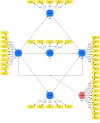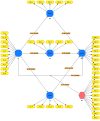The Nexus Between Ethical Leadership and Employees' Perception of Workplace Safety During COVID-19 Under Mediation and Moderation Model
- PMID: 37719686
- PMCID: PMC10505034
- DOI: 10.2147/RMHP.S426295
The Nexus Between Ethical Leadership and Employees' Perception of Workplace Safety During COVID-19 Under Mediation and Moderation Model
Abstract
Background: Workplace safety is a crucial aspect of employee well-being and organizational success, with ethical leadership playing a key role in shaping employees' perceptions of safety. Today, the underlying mechanisms through which ethical leadership influences workplace safety perception remain underexplored, especially in the Pakistan healthcare industry. Based on the social cognitive theory, this study aims to investigate the relationship between ethical leadership and workplace safety perception and examine the mediating role of media quality, communication climate, and supervisory communication and the moderating role of moral attentiveness.
Methods: An empirical survey method was used to conduct the quantitative study, with respondents representing nursing staff from hospitals in Pakistan. Data was collected using an online questionnaire during COVID-19, and Smart PLS was used to analyze the data.
Results: The study demonstrated that ethical leadership positively and significantly affects workplace safety perception. Media quality, communication climate, and supervisory communication mediate between ethical leadership and workplace safety perception. Moral attentiveness moderates the relationship between ethical leadership and workplace safety perception.
Conclusion: Ethical leadership is an essential tool that improves media quality, communication climate, supervisory communication, and moral attentiveness. The article presents a novel approach to examining the relationship between ethical leadership and workers' safety perceptions under the influence of mediating and moderating variables. By better understanding these dynamics, the study contributes to developing organizational strategies to improve workplace safety and overall employee well-being. In addition, it is a pioneering study exploring ethical leadership's role in influencing workers' perceptions of safety. Overall, the study is a great initiative that fosters the ethical concepts of individuals, thus achieving health protection and safety.
Keywords: COVID-19; communication climate; ethical leadership; healthcare policy; nurses; supervisory communication; workplace safety.
© 2023 Sun et al.
Conflict of interest statement
The authors report no conflicts of interest in this work.
Figures
References
-
- Samad A, Memon SB, Kumar M. Job satisfaction among nurses in Pakistan: the impact of incivility and informal climate. Glob Bus Organ Excell. 2020;39(4):53–59. doi: 10.1002/joe.22004 - DOI
-
- Kamal N, Samdani H, Zara B, Kamal K. Influence of ethical leadership on healthcare climate of innovation in Pakistan. Pakistan J Public Heal. 2018;8(4):219–224.
-
- Abbas M, Jamil S, Farid M. Are employed female workers at the increased burden of occupational injuries/diseases? First Comparative Study at the National for Pakistan. SSRN Electron J. 2023. doi: 10.2139/ssrn.4330175 - DOI
-
- Willis S, Clarke S, O’Connor E. Contextualizing leadership: transformational leadership and Management-By-Exception-Active in safety-critical contexts. J Occup Organ Psychol. 2017;90(3):281–305. doi: 10.1111/joop.12172 - DOI
-
- Shafique I, Kalyar MN, Rani T. Examining the impact of ethical leadership on safety and task performance: a safety-critical context. Leadersh Organ Dev J. 2020;41(7):909–926. doi: 10.1108/LODJ-07-2019-0335 - DOI
LinkOut - more resources
Full Text Sources







